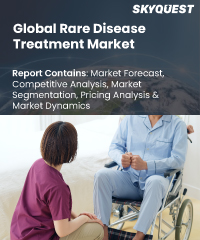
Report ID: SQMIG35E2037
Skyquest Technology's expert advisors have carried out comprehensive research and identified these companies as industry leaders in the Rare Disease Treatment Market. This Analysis is based on comprehensive primary and secondary research on the corporate strategies, financial and operational performance, product portfolio, market share and brand analysis of all the leading Rare Disease Treatment industry players.
The competitive landscape of the rare disease treatment market is characterized by a mix of established pharmaceutical companies and emerging biotechnology firms. Key players in the market are actively focusing on developing innovative therapies and expanding their product portfolios to address the unmet medical needs of patients with rare diseases. These companies are investing heavily in research and development to bring novel treatments to the market, leveraging advancements in biotechnology, genomics, and precision medicine. Additionally, partnerships, collaborations, and licensing agreements with academic institutions and research organizations are common strategies adopted to accelerate the development and commercialization of rare disease treatments. The market is witnessing a surge in strategic acquisitions and mergers aimed at consolidating resources, expertise, and pipelines to expedite drug development. With the growing emphasis on orphan drug designations and favorable regulatory incentives, the competitive landscape is expected to remain dynamic, with companies vying to secure a strong market position by delivering effective and targeted therapies for a wide range of rare diseases.
Rare Disease Treatment Market Top Player’s Company Profile
REQUEST FOR SAMPLE
Want to customize this report? This report can be personalized according to your needs. Our analysts and industry experts will work directly with you to understand your requirements and provide you with customized data in a short amount of time. We offer $1000 worth of FREE customization at the time of purchase.
Feedback From Our Clients

Report ID: SQMIG35E2037
sales@skyquestt.com
USA +1 351-333-4748